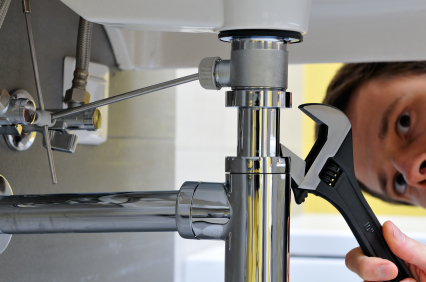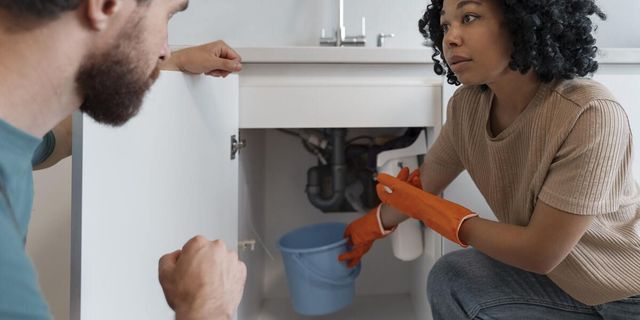Each person has their own assumption with regards to What to Do While Waiting for an Emergency Plumber.

Pipes emergency situations can strike at any moment, causing stress and anxiety and potential damages to your home. Whether it's a ruptured pipeline, a stopped up drain, or a dripping tap, knowing how to take care of the circumstance until an expert plumbing gets here can save you from further issues. This short article gives vital emergency pipes suggestions to aid you reduce damages and restore control throughout a plumbing situation.
Turn Off the Water
The initial step in any kind of plumbing emergency situation is to turn off the water. For localized concerns, such as a leaking tap or toilet, shut off the valve near the fixture. When it comes to a major leakage or burst pipeline, locate your home's primary water shut-off shutoff and turn it off promptly. Knowing the place of these valves in advance can conserve important time throughout an emergency situation.
Turn off Your Hot Water Heater
In certain emergency situations, such as a ruptured pipe, it's smart to shut down your water heater. This stops overheating or damage to the system when water quits flowing. Shut off the power supply to the hot water heater (electric or gas) and let it cool to avoid prospective dangers.
Temporarily Stop a Ruptured Pipeline
A ruptured pipeline can result in substantial water damage in mins. To minimize the problem:
- Clamp or Cover the Pipe: Utilize a pipe clamp, rubber, or air duct tape as a temporary seal.
- Divert Water Flow: Ideally, draw away the water into a bucket or basin to restrict damages to bordering areas.
- Keep the Area Dry: Use towels or a wet/dry vacuum cleaner to get rid of standing water.
- Call a professional plumbing right away to attend to the trouble completely.
Have an Emergency Plumbing Kit
Prepare a fundamental plumbing emergency situation package to take care of small issues effectively. Your kit ought to include: - Adjustable wrench
- Plumbing technician's tape
- Pipeline secures
- Towels and dustcloths
- A bettor
- Epoxy putty
- Bucket.
- Having these tools on hand can make a significant difference in your ability to manage emergencies.
Unclog Drains Safely.
A blocked drain can be an aggravating and untidy problem. Here's how to tackle it:. - Use a Plunger: For sinks or commodes, a bettor can commonly remove small obstructions. Ensure you utilize the appropriate type of bettor for the component.
- Warm Water and Meal Soap: For grease-related blockages, pour a mixture of hot water and recipe soap away to separate the grease.
- Avoid Chemical Drainpipe Cleaning company: While appealing, chemical cleansers can trigger even more injury than good, especially to older pipes.
- If these techniques don't function, prevent making use of too much pressure, as it might aggravate the obstruction.
Handle Overflowing Toilets.
An overflowing bathroom can cause immediate chaos. Here's what you should do:. - Quit the Water Circulation: Get rid of the container cover and push down on the flapper valve to stop water from entering the dish. Switch off the water system to the bathroom if required.
- Plunge Gently: Make use of a commode bettor to remove the blockage, but stay clear of hostile plunging, which can trigger splashing or further damages.
- Consist of the Spill: Use towels or a mop to clean up water promptly to avoid flooring damage.
Address Tiny Leakages with Short-term Fixes.
Small leakages can swiftly become significant troubles if left untreated. Use these temporary solutions up until professional aid shows up:.
- Pipe Tape or Epoxy Putty: Use water resistant tape or epoxy putty to temporarily secure the leakage.
- Rubber and Clamp Method: Cover an item of rubber or an old inner tube around the leakage and protect it with a hose clamp or air duct tape.
- Containers or Towels: Place containers under the leak to have water and stop damage to floor covering or furniture.
- While these solutions aren't long-term, they can help decrease water loss and damage.
Take Care Of Frozen Water Lines Carefully.
In cooler climates, icy pipes are an usual emergency. If you suspect an icy pipe:. - Shut off the Water: Shut off the major supply of water to stop a burst pipeline.
- Thaw Gradually: Make use of a hairdryer, heating pad, or cozy towels to thaw the pipe slowly. Stay clear of open flames or extreme warmth, as these can damage the pipe.
- Check for Leaks: Once the pipeline is thawed, check for splits or leakages before transforming the water back on.
Know When to Call a Specialist.
While quick fixes can help briefly, particular plumbing issues need prompt professional interest. Call a plumbing professional if:.
- A ruptured pipe causes substantial flooding.
- Drains pipes or toilets remain stopped up regardless of your initiatives.
- You notice consistent leakages or water stress concerns.
- Your water heater is leaking or malfunctioning.
- Quickly calling a specialist makes certain the issue is dealt with properly and stops more difficulties.
Prevent More Damage.
Taking quick action to reduce damage can conserve you money and time in the future. Here's how:. - Move Valuables: Remove furniture, electronics, and other products from the afflicted location.
- Usage Sandbags: For flooding situations, location sandbags around the area to redirect water.
- Turn off Electrical power: If water has reached electrical outlets or home appliances, switch off the electricity to prevent shocks or fires.
Final thought.
Plumbing emergencies can be overwhelming, but with the best understanding and devices, you can take care of the scenario properly till aid arrives. By turning off the water supply, dealing with small leaks, and utilizing short-term repairs, you can reduce damage and keep your home safe. Keep in mind, these tips are temporary remedies; constantly seek advice from a certified plumber to handle the origin of the issue. Preparation and quick reasoning are your ideal allies in any type of plumbing emergency.
8 Helpful Tips for Managing Plumbing Emergencies at Home
If your plumbing system hasn’t failed once, wait for it because almost everyone has a story to tell. Sometimes, it could be simple emergencies such as a leaking pipe, a blocked cistern, or even a big burst pipe. In situations like this, you need to have some handy tips to save you some money and from possible damages.
Take care of minor issues early.
Sometimes, you could have avoided an emergency by taking proactive measures while it was still early. Some major plumbing emergencies can be a result of an ignored minor issue. We recommend that you have items like plumbing tapes and other related items. A plumbing tape can allow you to manage minor leaks before the plumber arrives.
Cut off the water supply.
This tip is essential in almost any type of leakage problem. For problems like minor leakages in the toilet or kitchen, turn off the supply that takes water to the affected pipes. If the leakage is a major pipe, you must shut off the supply valve to the entire building. This will help you avoid flooding your home and neighbors if you share a flat.
Know your plumbing system
Folks typically move into a new apartment without understanding the water supply around the building. This can prove disastrous if a water emergency arises and the plumber is far away. The previous tip will prove useless if you don’t practice this one. More importantly, know where your water shut-off valve is located – you’ll need that knowledge to prevent potential home floods.
Have some common handy tools
There are lots of plumbing emergencies that you can handle without hiring a plumber. That’s why you must keep some tools available always. Some tools that you can use to fix simple plumbing emergencies easily include plumbing tapes, screwdrivers, thread seal tapes, plungers, pliers, tape measures, and rubber gloves.
Insulate your pipes from cold
You’ll save yourself from many plumbing expenses if you protect your water pipes from the cold. This is because of the harmful effects that cold weather can have on your pipes. During winter, your pipes can burst from being overly expected to freezing temperatures. So, make sure insulators are there to keep the pipes working correctly.
Avoid practices that will clog your toilet.
Many people indulge in practices that can damage the plumbing system of the entire building. One of these is when they use their toilet to dispose-off garbage. They flush all kinds of things, such as paper towels, bandages, hairs, female sanitary products, etc., down the toilet. This will block your toilet in the long run, incurring unnecessary expenditures. Dump such waste in the trash instead.
Check your dials regularly.
Sometimes, there could be leakages in your home without noticing them in time. So, constantly monitor your water meter dial. If the dial is reading when there is nobody using water, this is an indicator that there is leaking. Check for leaks immediately. Call a plumber as soon as possible if you can’t find any.
https://www.constructionplacements.com/8-helpful-tips-for-managing-plumbing-emergencies-at-home/

We had been shown that article about Expert Tips for Emergency Plumbing Repairs through a buddy on a different web property. Are you aware of another person who is sincerely interested in the subject? Please feel free to promote it. Kudos for being here. Return soon.
Book
Comments on “Managing Emergency Plumbing Issues: Immediate Solutions Until Specialist Help Arrives”